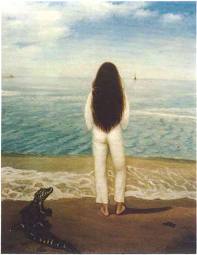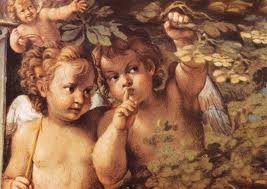Daily Wisdom: Desire

The Erotic and the Holy
Marc Gafni
For more information on private study or to book a public teaching, contact Dr. Marc Gafni at support@ievolve.org

The Erotic and the Holy
Marc Gafni
For more information on private study or to book a public teaching, contact Dr. Marc Gafni at support@ievolve.org

The same is true of music. Music is not limited to symphonies or rock concerts. We are all musicians and life is overflowing with music. Remember the Broadway show “Stomp”? There was no dialogue; it was all music and dance. The catch was that no musical instruments were used. The instruments were adapted from the fabric of everyday living. Pots, pans, brooms, sinks, faucets, garbage can lids, bottles, bags, newspapers, hands, feet, virtually every part of the body – all of these became instruments of music. The implication is stunning; what we usually do is limit art to formal work by people we call artists, just as we limit music to formal instruments. Formal music and art need to model the erotics of sound and beauty in all of our lives and not just in their narrow provinces. Music and art need to pervade all of living. Every moment is a canvas and is possessed of its own melody.
Rumi knowingly instructs us:
Let the beauty that we love be what we do.
There are hundreds of ways to kneel and kiss the Ground.
The Erotic and the Holy
Marc Gafni
For more information on private study or to book a public teaching, contact Dr. Marc Gafni at support@ievolve.org

But the rhyme of mystical meaning continues, for these two words added together equal twenty-six. Twenty-six is a central number in Hebrew mysticism because it is the numeral value of God’s four letter name: Yud Hei Vav Hei – יהוה – the divine name of healing and love. Thus, God is One Love. Love is the universe’s way of embracing us and telling us we are not alone. We have a home, a bayit. We are connected.
One + One = One.
The Erotic and the Holy
Marc Gafni
For more information on private study or to book a public teaching, contact Dr. Marc Gafni at support@ievolve.org
If I listen to the murmuring of my soul, I am in effect listening to the murmuring of the sacred God.
(Rabbi Mordechai Lainier of Ishbitz, a radical Hassidic teacher of the nineteenth century, teaches in his stunning work, Mei Shiloach, Volume One, p. 19, Column 2)
Excerpted from The Erotic and the Holy by Marc Gafni
For more information on private study or to book a public teaching, contact Dr. Marc Gafni at support@ievolve.org
By Marc Gafni
From my book, The Mystery of Love:
Photo Credit: presta
Love is all about insight–in-sight. It is the ability to see in, to the inside of the inside, to the Holy of Holies that is your lover. Eros is being on the inside. Thus, love is an erotic perception of the highest order. Naturally you have to move way beyond sexual seeing. Sex only models eros. To be an erotic lover you have to understand that “what is essential is invisible to the eye.”
When something is far from you, you have to open your eyes really wide to see it. As it gets closer you squint your eyes, when it gets really really close, you close your eyes. Seeing with closed eyes is when we perceive way beyond seeing. The adjective close and the verb close are the same word. Closeness–intimacy–higher vision–all happen when we close our eyes. We move beyond sight and invite the other faculties of perception to guide us. Smell, sound, touch, and taste all become alive in a deeper way when we close our eyes.
By Marc Gafni
What does it mean to be fair? In one sense being fair means to be just and good. To be fair is to be honest and have integrity.
Fairness implies appropriate weights and measure. To be fair means to give things the right weight and measure accurately.
When my sons were young the phrase that would indicate that they were the most upset or disturbed was the mixed English and Hebrew idiom, “Zeh Lo Fair.” It’s not fair. When they said that, they were appealing to a universal standard of the good and the just, which has ultimate natural authority.
The word “fair,” however has a second meaning as well. To be fair means to be beautiful.
The Queen asks the Mirror in the famous Snow White legend, Mirror on the Wall, “who is the fairest of them all.” And of course there is My Fair Lady. To be fair then is also a quality of aesthetics.
This reminds us that a lack of fairness is not merely an issue of justice but also an issue of beauty. Goodness and integrity are beautiful. To be unfair is not only a violation of justice, it is to be ugly.
All too often in the spiritual world fairness is seen as a practical obligation and an ethical value. And it is that as well. But it is so much more than that.
When someone — anyone — is treated unfairly, a kind of sordid ugliness is born into the world. It can be papered over with a thousand popular albeit numbing spiritual platitudes. It remains just as ugly.
In a forthcoming book (Radical Kabbalah, 2012), I trace the original texts in Hebrew mysticism that talk of the goddess, especially in the work of one pivotal Hasidic master. From a careful reading of that the entire Eros of the goddess is really about justice. The erotic passion of the goddess in Hassidic teaching is about the radical erotic commitment to fairness.
It is in that sense that some of the minions of the goddess in this world are sometimes called fairies. A fairy is a gentle yet sacred and seductive incarnation of the goddess. The fairy is both fair and fair. Beautiful and just. Any good devotee of Peter Pan and Tinkerbelle knows is that to believe in fairies is to give them life. If we would chant Tinkerbelle’s mantra, “I do believe in fairies I do, I do,” fairies come to life as integrity and beauty are once again united and made manifest in the land.

When something is far from you, you have to open your eyes really wide to see it. As it gets closer you squint your eyes, when it gets really really close, you close your eyes. Seeing with closed eyes is when we perceive way beyond seeing. The adjective close and the verb close are the same word. Closeness–intimacy–higher vision–all happen when we close our eyes. We move beyond sight and invite the other faculties of perception to guide us. Smell, sound, touch, and taste all become alive in a deeper way when we close our eyes.
The Mystery of Love
Page 114
For more information on private study or to book a public teaching, contact Dr. Marc Gafni at support@ievolve.org
We are on a journey to Love. For as the Zohar writes, ‘All the Paths (Shilin) lead to the Temple of Love.’ Wherever you are, wherever you are standing or kneeling or crouching — the place where you are is on your path to Love.’
The Erotic and the Holy
For more information on private study or to book a public teaching, contact Dr. Marc Gafni at support@ievolve.org
In reaching for the awakening of love, we do well to bear in mind the teaching of mystical master Menachem Mendel of Kutz. Writing in eastern Europe in the first half of the nineteenth century he offers an original deeply resonant re-reading of a biblical myth text. “These words which I command you this day should be on your hearts.”
How do words sit on a heart? Do they not either enter in or stay outside? What could it mean to have words sit “on the heart?” Answers the master, ‘When dealing in issues of heart-lev-love — one cannot force the heart’s opening.’ Love is mystery — the word mystery deriving originally from the Hebrew word Seter — meaning secret. The greatest secret, the most wondrous mystery, is the openings and closings of the heart. ‘The best we can hope to do – and that is alot – is to place our words on the heart–and when the heart opens the words fall in.’
The Erotic and the Holy
For more information on private study or to book a public teaching, contact Dr. Marc Gafni at support@ievolve.org
The truly great dancer – like all lovers- flows with the fullness of being. She trusts the universe. She knows she will always fall right so she allows herself to fall into the erotic rhythm of life. To do so she must first empty herself to receive the flow.
The word ”˜dance’ in the original Hebrew is mehol. It has two virtually opposite meanings. Mehol is etymologically identical with the word hallul which means empty. From here springs the Hebrew word mehila –forgiveness. Forgiveness comes from the ability to empty myself to receive the full wonder, complexity and imperfection of another. Mehol however also means halah – fullness – used in the biblical myth text to describe the erotic fullness of a pregnant woman.
The Erotic and the Holy
For more information on private study or to book a public teaching, contact Dr. Marc Gafni at support@ievolve.org
God in the first person is the experience of God flowing through you. God flows through you not by your denial of your unique perspective, or what Carlos Castaneda and many teachers influenced by him referred to as your “personal his-tory” ”” rather, your unique perspective is precisely the place in which you the human being meets and embraces the divine. Thus, God in the first person according to the Hebrew wisdom masters is realized not through generalized meditation which effaces one’s unique perspective, as is usually thought to be the case. Rather, it is accomplished by what Lainer of Izbica calls Berur – literally, clarification or purification. Berur is a mystical technique which can take many forms, including meditation. The core of it, however, is that through Berur you merge with your radically unique perspective. This is your unique face. It is only through the embrace of your unique perspective that you are able to transcend your narrow human perspective to embrace a divine perspective.
Book of Tears
Marc Gafni
Pages 10, 11
For more information on private study or to book a public teaching, contact Dr. Marc Gafni at support@ievolve.org
All lovers are revealers of the Divine in each other. God seeing God.
All love is the love of God.
~ RECANATI, a renaissance mystic
Love is to perceive another person unmasked, in the pristine beauty of their spiritual and emotional nakedness. Love is the pleasure produced by such a perception, when our loving awareness strips the beloved of all outer coatings until she stands fully revealed before the perceiving mind.
Love is a perception of the full divine wonder that is your beloved.
The Mystery of Love
Marc Gafni
Page 112
For more information on private study or to book a public teaching, contact Dr. Marc Gafni at support@ievolve.org
One of the places where we overcome alienation and step inside to an act of surrender is the sacred realm of music. Eros cuts through ego and touches essence. We feel alive and totally present in the fullness of our longing. Mastery in song and music takes place precisely at the point where radical discipline and control are transcended. At the intersection between control and surrender the singer or musician gives herself up, allowing herself to be played by the universe. It is of course not an accident that an essential component of the Temple service was music. The biblical myth text reads, “If you are searching for Shechina” then come to the Temple with its symphony of holy song. Through music from exotic instruments and songs that opened the heart, the people were aroused to the erotics of desire and personal surrender.
Mystery of Love
Marc Gafni
Page 165
For more information on private study or to book a public teaching, contact Dr. Marc Gafni at support@ievolve.org
Her name means Indwelling Presence, “the one who dwells in you.” She is presence, poetry, passion. She is the sustaining God force that runs through and provides a womb for the world. She is the underlying erotic, sensual, and loving force that knows our name and nurtures all being.
Shechina captures an experience, a way of being in the world, for which we do not yet have an English word. For this is a way of being that we in the West are hard-pressed to articulate. It is the experience of waking up in the morning full of utter joy for the arrival of the day. It is weeping over the splendor of the sunset or the scent of the ocean or the fragility of a newborn. It is a way of living in love.
The Mystery of Love
Marc Gafni
Page 9
For more information on private study or to book a public teaching, contact Dr. Marc Gafni at support@ievolve.org
The Eros of evolution dances up the evolutionary spiral to higher and higher levels of complexity, and consciousness emerges from the evolutionary soup. It is a continual process of self-organization through self-transcendence, in which self transcends itself to recognize and join other in higher embrace. Love by any other name. The evolutionary ladder continues to spiral to ever-higher and deeper levels of complexity and consciousness. Each higher level is always defined by ever-higher levels of mutuality, recognition, union, and embrace between the evolving cells and organisms. Plants, amphibians, mammals, then higher mammals, until we get to the full bloom of human consciousness. This is the Great Story of One Love: Evolutionary Love.
Your Unique Self (in press)
For more information on private study or to book a public teaching, contact Dr. Marc Gafni at support@ievolve.org
In our previous 3 posts we introduced a provocative Hebrew wisdom masters koan, “Great is teshuva, for in it intentional sins become great merits.”
Here is the third and final interpretation to help animate this koan in our lives:
The third understanding of the power of teshuva: the spiritual time machine. Teshuva literally means “to turn or return.” To return to where?
It could man to return to the scene of the crime and not do it again. If adultery with your best friend’s wife is the sin, then it means that you have the same opportunity–sexy and willing woman, available apartment, alibii, and the same level of attraction–but this time you set a sacred boundary.
Or it could mean something else entirely. It could mean that you return not only to the same situation and even the same place, but also that time itself warps and you return to the same moment. When the desire to make amends is driven by love, be it love of God, self, or other, then time warps and makes herself available. The mystery of love modeled in the sexual is that time is not absolute. It bends to the will of love and eros.
The Mystery of Love
Marc Gafni
Page 301
For more information on private study or to book a public teaching, contact Dr. Marc Gafni at support@ievolve.org
In our previous post we introduced a provocative Hebrew wisdom masters koan, “Great is teshuva, for in it intentional sins become great merits.”
Here is the first interpretation to help animate this koan in our lives.
 First, there is the great erotic principle of yearning. Sin in Hebrew mysticism is a force of separation and division. Sin separates the human being from her divine source. The further you pull away, the more powerfully the force to return builds. As Isaac Newton said, every action has an equal and opposite reaction. The greater the separation, the deeper and more powerful is the yearning to return. (Imagine a rubber band that is pulled taut and then released.) The energy of the fall is transformed into yearning, and the person winds up being a much better person than had they never fallen. In this way through the process of teshuva–implying recognition, regret, and future commitment–intentional sins are transformed into virtues.
First, there is the great erotic principle of yearning. Sin in Hebrew mysticism is a force of separation and division. Sin separates the human being from her divine source. The further you pull away, the more powerfully the force to return builds. As Isaac Newton said, every action has an equal and opposite reaction. The greater the separation, the deeper and more powerful is the yearning to return. (Imagine a rubber band that is pulled taut and then released.) The energy of the fall is transformed into yearning, and the person winds up being a much better person than had they never fallen. In this way through the process of teshuva–implying recognition, regret, and future commitment–intentional sins are transformed into virtues.
The Mystery of Love
Dr. Marc Gafni
Page 300
For more information on private study or to book a public teaching, contact Dr. Marc Gafni at support@ievolve.org
We should not think of our past as definitely settled … my past changes every minute according to the meaning given it now, in this moment. — CZESLAW MILOSZ
The most potent expression of the healing power of time circle consciousness is the mystical idea of teshuva, which is a word we have encountered before. Literally meaning “returning,” it describes the process by which we make amends and try to fix the mistakes of the past. Mis-takes are the times when we misperceived reality or ourselves and were not at our best. As we saw early on, love and perception are virtually synonymous. So mis-takes are the times we weren’t able to be lovers.
There is a provocative koan of the Hebrew wisdom masters where they say, “Great is teshuvah, for in it intentional sins become great merits.” What is radical about “teshuva” is that not only are past sins erased, but they are also mysteriously transformed into great merits.
The Mystery of Love
Dr. Marc Gafni
Pages 299, 300
NOTE: Look for a continuation on this topic on this site in the next few postings
For more information on private study or to book a public teaching, contact Dr. Marc Gafni at support@ievolve.org
 The body leads to the soul, and the soul leads back to the body. “When I look at the I of my body I find the I of my soul. When I look at the I of my soul I find the I of God.”
The body leads to the soul, and the soul leads back to the body. “When I look at the I of my body I find the I of my soul. When I look at the I of my soul I find the I of God.”
The Sufis have a wonderful saying–“Say your praise to Allah and tie your camel to a post.” What this really means is, touch the fullness of God and let that inspire even the simplest service.
The Mystery of Love
Dr. Marc Gafni
Page 324
For more information on private study or to book a public teaching, contact Dr. Marc Gafni at support@ievolve.org

From The Mystery of Love:
The trees are part of the Goddess’s erotic manifestation. The central symbol of much of the ancient pagan cult in biblical Canaan was the Ashera tree. The Ashera is the feminine earth goddess erotically expressed in the image of the Ashera tree. In a wonderful phrase of Keats, “Even as the trees that whisper round the temple become soon as dear as the temple self.” For the pagan, the hills were literally alive with the sound of music. Nature is the music of divinity undressed to the human ear. Every hill, brook, tree, and blade of grass was invested with its own divine muse.